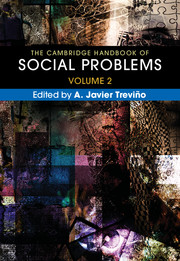Book contents
- The Cambridge Handbook of Social Problems
- The Cambridge Handbook of Social Problems
- Copyright page
- Contents
- About the Contributors
- Introduction
- Part I Problems Related to Health, Safety, and Security
- Chapter 1 Illness and Health Care
- Chapter 2 Mental Illness and Social Problems
- Chapter 3 Substance Abuse
- Chapter 4 Epidemics, Pandemics, and Outbreaks
- Chapter 5 Disaster as Social Problem and Social Construct
- Chapter 6 Surveillance
- Chapter 7 Domestic Spying: A Historical-Comparative Perspective
- Chapter 8 Computer Hacking as a Social Problem
- Chapter 9 War and Militarism
- Chapter 10 The Social Problem of Terrorism
- Chapter 11 Genocide
- Part II Problems Related to Crime and Violence
- Part III Problems of Global Impact
- Index
- References
Chapter 7 - Domestic Spying: A Historical-Comparative Perspective
from Part I - Problems Related to Health, Safety, and Security
Published online by Cambridge University Press: 16 March 2018
- The Cambridge Handbook of Social Problems
- The Cambridge Handbook of Social Problems
- Copyright page
- Contents
- About the Contributors
- Introduction
- Part I Problems Related to Health, Safety, and Security
- Chapter 1 Illness and Health Care
- Chapter 2 Mental Illness and Social Problems
- Chapter 3 Substance Abuse
- Chapter 4 Epidemics, Pandemics, and Outbreaks
- Chapter 5 Disaster as Social Problem and Social Construct
- Chapter 6 Surveillance
- Chapter 7 Domestic Spying: A Historical-Comparative Perspective
- Chapter 8 Computer Hacking as a Social Problem
- Chapter 9 War and Militarism
- Chapter 10 The Social Problem of Terrorism
- Chapter 11 Genocide
- Part II Problems Related to Crime and Violence
- Part III Problems of Global Impact
- Index
- References
Summary
Domestic spying is a cultural construct that refers to the activities of, and debate on, intelligence agencies oriented at the home population of citizens within nations. In the United States, the debate on domestic spying has been especially intense as the country has a long-standing culture and accompanying legal and political framework devoted to protecting individual rights of nonintervention. Unlike several other democratic nations, the United States has no specialized self-standing domestic intelligence agents, with such functions being handled by other agencies of law enforcement and foreign intelligence. This chapter reviews the patterns and dynamics of domestic spying in terms of the historical development of domestic intelligence work and offers a comparative overview of such activities in a number of nations. This comparative-historical outlook should be advantageous both for the analysis of domestic spying as a social problem and in terms of the normative framing of the debate within cultures committed to civil liberties as well as national security.
- Type
- Chapter
- Information
- The Cambridge Handbook of Social Problems , pp. 109 - 126Publisher: Cambridge University PressPrint publication year: 2018
References
- 2
- Cited by



